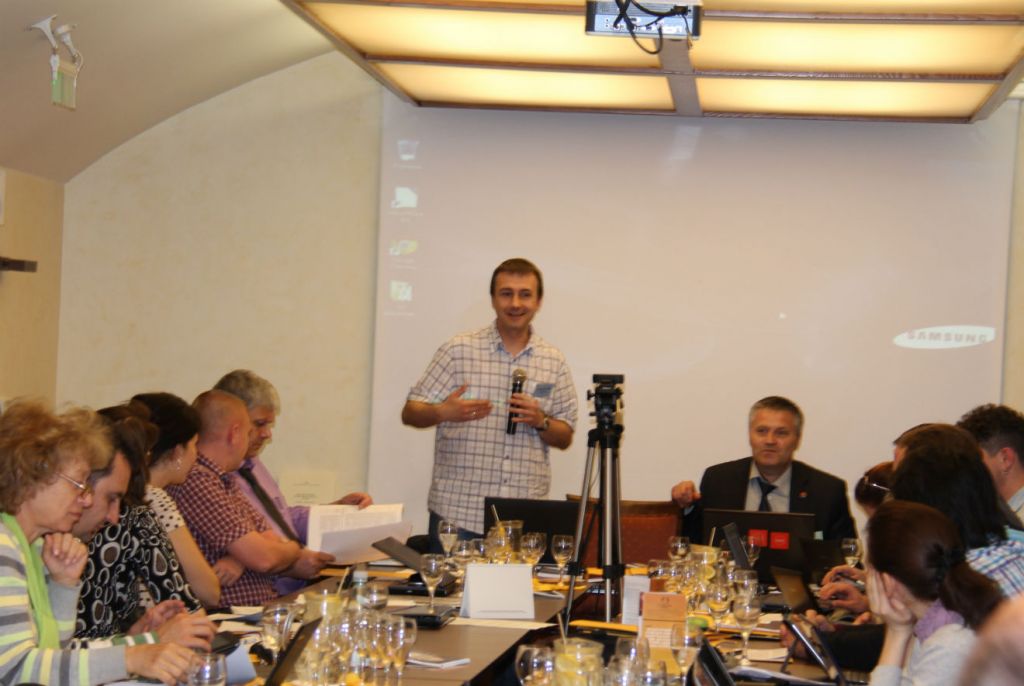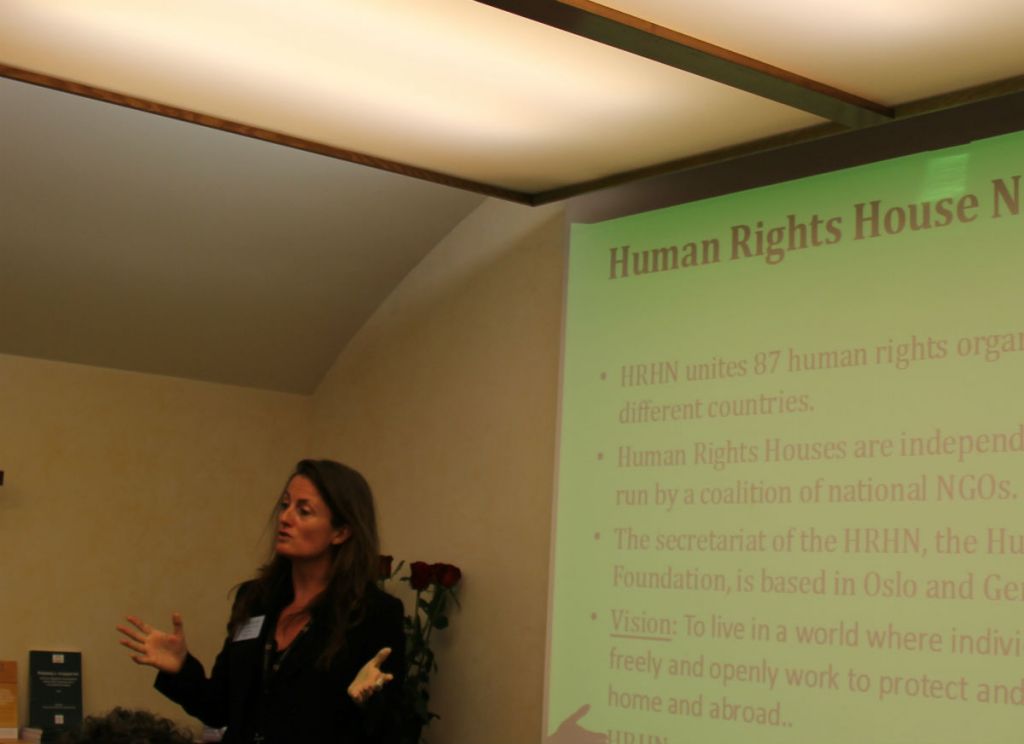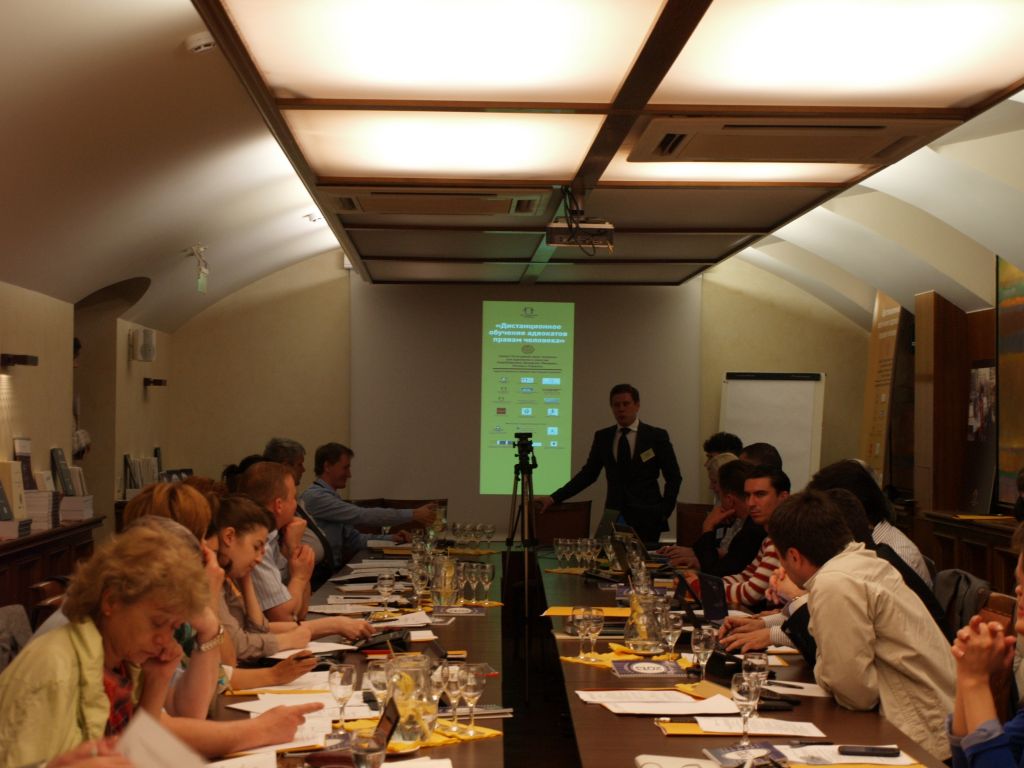More than 60 people came to the conference, organized within the framework of the project on distance learning of legal mechanisms of the protection of human rights for lawyers and advocates. There were the alumni, project experts, representatives of the Human Rights House Network and partner organizations of the project among the participants. Within the framework of project the participants received the theoretical knowledge of how to use the international and European human rights mechanisms and how to work with the legal standards at the national level.
When opening the conference, Tatsiana Reviaka, President of the Belarusian Human Rights House, noted that all the five states, whose representatives were trained within the project, have one common feature – the lack of understanding that human rights are a universal value.There are often claims made, that human rights are Western values. The work of lawyers and human rights defenders on the implementation of international standards into national legal systems, in her opinion, has the particular importance: “Our task is to change the situation in our countries through the tools that are available for us: the law, the legislation, and the international instruments.”
 Liudmila Ulyashyna (left), the manager of “International Law in Advocacy” program implemented by Human Rights House Network, also underlined the importance of competent lawyers’ activities for the society. She drew attention to the need to go beyond the bounds of national law, if it contradicts international obligations in the sphere of human rights. Personal and professional development of lawyers is one of the conditions of their participation in the successful implementation of these commitments at the national level: “Lawyers are the very unique group in any society. For centuries the lawyers were the part of the state system and supported the ruling class. Since the beginning of the normative legal regulation of the concept of human rights, the lawyers started to protect individual rights and insist on the need to follow the international and constitutional guarantees, eventually becoming the critics of the state. This conflict, however, is likely to see not as a counteraction, but as a legal dispute of the parties, in which lawyers are acting on the basis of the legal provisions, which the states agreed with, and remind how these provisions should be implemented. Acting in that capacity, lawyers and advocates can become the decisive force that would make the human rights the effective legal instrument.”
Liudmila Ulyashyna (left), the manager of “International Law in Advocacy” program implemented by Human Rights House Network, also underlined the importance of competent lawyers’ activities for the society. She drew attention to the need to go beyond the bounds of national law, if it contradicts international obligations in the sphere of human rights. Personal and professional development of lawyers is one of the conditions of their participation in the successful implementation of these commitments at the national level: “Lawyers are the very unique group in any society. For centuries the lawyers were the part of the state system and supported the ruling class. Since the beginning of the normative legal regulation of the concept of human rights, the lawyers started to protect individual rights and insist on the need to follow the international and constitutional guarantees, eventually becoming the critics of the state. This conflict, however, is likely to see not as a counteraction, but as a legal dispute of the parties, in which lawyers are acting on the basis of the legal provisions, which the states agreed with, and remind how these provisions should be implemented. Acting in that capacity, lawyers and advocates can become the decisive force that would make the human rights the effective legal instrument.”
The final conference provided the participants with the opportunity to practically demonstrate their knowledge: they were able to apply acquired skills during the moot court, to submit plans for advocacy campaigns on the implementation of international standards at the national level, to share their success in this area, to get practical advice and learn from the experiences of their colleagues. Liudmila Ulyashyna welcomed the participants and stressed that the final conference is also the beginning of the graduates’ path from learning to action.
The moot court, organized during the conference, was the platform that allowed graduates of the project to imply their knowledge of the preparation and pleading the cases in international courts, and at the same time to perfect their skills of argumentation in public speaking.
 During the next part of the conference, dedicated to the international law in advocacy, the discussions were held with Veaceslav Ţurcan, the Chair of the «Human Rights Embassy», Moldova, and Serhiy Burov, board member of the Ukrainian Helsinki Human Rights Union. The groups of representatives from each country presented successful practices of implementation of international obligations in their countries and were able to listen to comments, suggestions and advice from more experienced colleagues.
During the next part of the conference, dedicated to the international law in advocacy, the discussions were held with Veaceslav Ţurcan, the Chair of the «Human Rights Embassy», Moldova, and Serhiy Burov, board member of the Ukrainian Helsinki Human Rights Union. The groups of representatives from each country presented successful practices of implementation of international obligations in their countries and were able to listen to comments, suggestions and advice from more experienced colleagues.
Some presentations of the Human Rights House Network’s experts in the field of international advocacy, gave the graduates of the project the opportunity to get “first-hand” information about successful practices and experience o f the work of human rights organizations at the international level. Maria Dahle (right), the Executive Director of the Human Rights House Foundation presented the structure and the work with advocacy of the Human Rights House Network.Florian Irminger, the Head of Advocacy and Human Rights House Foundation Geneva Office, presented for the participants advocating of Human Rights House Network in the United Nations, and Anna Gerasimova, the Director of the Belarusian Human Rights House, shared the experience of the Belarusian human rights defenders at the advocacy in the UN and gave participants some practical guidelines, which can help to facilitate the work in this sphere.Intigam Aliyev, the director of the Legal Education Society, presented the experience of advocacy in the European Union.
f the work of human rights organizations at the international level. Maria Dahle (right), the Executive Director of the Human Rights House Foundation presented the structure and the work with advocacy of the Human Rights House Network.Florian Irminger, the Head of Advocacy and Human Rights House Foundation Geneva Office, presented for the participants advocating of Human Rights House Network in the United Nations, and Anna Gerasimova, the Director of the Belarusian Human Rights House, shared the experience of the Belarusian human rights defenders at the advocacy in the UN and gave participants some practical guidelines, which can help to facilitate the work in this sphere.Intigam Aliyev, the director of the Legal Education Society, presented the experience of advocacy in the European Union.
Sergey Dickman, the representative of the Council of Europe, and Jolanta Samuolyte, the national tutor of the e-course on the eligibility criteria of complaints addressed to the European Court of Human Rights, told the participants about the actions and the opportunities offered by the HELP program of the Council of Europe. The HELP program, which was launched in 2006, is one of the ways how the Council of Europe ensures the efficiency of ECHR and increases the implementation of the Convention at the national level.
The participants of the project, in turn, thanked the organizing team of the project for the year of training, noting that the gained knowledge has largely changed their opinion on the professional activities and opened up new opportunities for further work.
***
The Electronic Human Rights Education for Lawyers (EHREL) is a project under the Human Rights House Network program “International Law in Advocacy” prepared and implemented in cooperation with Human Rights House Foundation’s partner organizations.
The project is designed to bring lawyers from CIS countries together via online human rights training material prepared by international and national experts. The learning process is supervised by a team of managers, regional partners and coordinators.
The project facilitates efforts to fulfill commitments made within the framework of the United Nations, the Council of Europe and other international organizations to support implementation of human rights (HR) obligations in the Commonwealth of Independent States (CIS) countries.
Related articles
Disbarred Belarusan lawyers support Ukrainian colleagues
Participants of ILIA project fight the problem of torture in Moldova
Belarusian participants of ILIA project considered the best lawyers of the year





